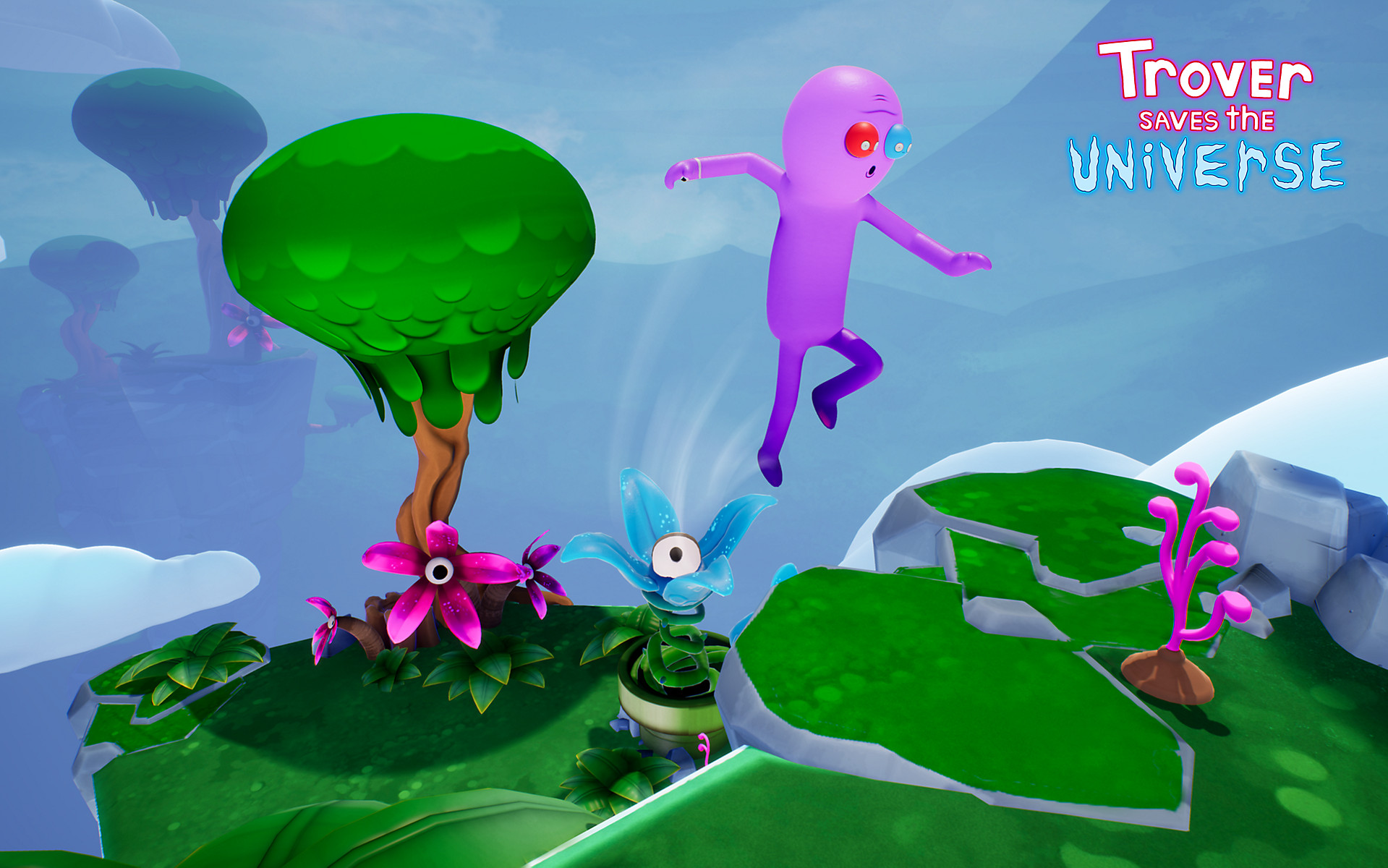Rick and Morty Mastermind Accidentally Created a New Game Genre
The story of How Trover Saves the Universe came to be is a big, weird, delightful accident.
SEATTLE – When Trover Saves the Universe debuted at E3, I thought I might want to play it. Now, I absolutely have to play it. This first-person/third-person/puzzle/action hybrid is absolutely unlike any other game I've ever played. And now that I've had a chance to sit down with the man behind the game, Justin Roiland, I can report that the entire production is a big, weird, delightful accident.

I went hands-on with two Trover Saves the Universe demos at PAX West 2018: a VR snippet from E3, as well as a brand-new non-VR demo for PAX. In the game, you play as a member of a chair-bound race, who gets around by teleporting. When a giant monster steals your dogs to use as his new eyeballs (no, this doesn't make any more sense in context), a purple alien named Trover drags you out of your house on a quest to try to set things right.
MORE: Best PS4 Games
The first thing I noticed about the game is that it's a weird hybrid between first-person and third-person gameplay. You teleport around the environment, interact with objects and "pop up" in your chair to get better vantage points. But you also control Trover, who can run, jump and smash items with an energy sword.
"It's just bizarre, and it's kind of amazing," Roiland told Tom's Guide. "I don't know any other game that does what we accidentally created." Roiland began to design the game with VR in mind, hence the first-person perspective. But as the title's design came together, he realized that structure might just work without the benefit of a VR headset. "In solving these problems, we created a weird and shockingly fun traditional game."
The benefits of VR
While VR gaming hasn't taken off to the extent that its bolder proponents imagined, it also hasn't fizzled like the earlier attempts back in the '90s. Still, Roiland believes that VR could have a place for everyone – if manufacturers can make it approachable enough.
"My hope is that VR catches on, on a major level," he said. For that to happen, Roiland proposed a few conditions: a totally standalone device (like the Oculus Go, which doesn't need a computer attached), with a massive hard drive, a long-lasting battery, a robust downloadable game store and input controls with six degrees of movement, all available at $300 or less, like a standard console.
"That, combined with some real killer apps – that's when it will become a mass-adoption scenario, I think."
It's not necessarily something that could happen overnight, but Roiland cited the 3DS, which also seemed like something people didn't need. With a low enough price tag and enough good games, it became a massively popular device, especially people realized just how much fun its unique titles could be.
In fact, Roiland believes that one of the reasons VR hasn't quite taken off yet is because a lot of people had a subpar first experience with it.
"I think Google Cardboard hurt VR," he explained. Cardboard's unimpressive framerate and tracking – in addition to the fact that it was sort of a cobbled-together experience rather than a dedicated VR device – made people think that all VR had to offer was a series of touch-and-go tech demos. "[It's like] you ate a popcorn-flavored Jelly Belly. You need to try real, delicious, buttered popcorn."
He then stopped to rephrase the point, because he thought the buttered popcorn example was a "sh***y analogy," but I kind of liked it.
Humor in gaming
The two demos also had me in stitches, as Trover and the other denizens of the world went on long, aimless, profanity-laden rants about nothing in particular. When Trover fought off some museum guards with his energy sword, they would spout out completely deadpan lines like, "Oh, you're f***ing killing me," like getting bisected with an energy weapon was the emotional equivalent of waiting in line at the post office. (They also sounded a lot like Rick, whereas Trover sounds a lot like Morty; as in Rick and Morty, Roiland does a lot of the voicework himself.)
I though the humor was similar to Rick and Morty, but Roiland explained that he was going for a looser, more laid-back feel. This explains why the characters often just rambled on – admittedly, to great comic effect – rather than engaging in the tight one-liners and sight gags of Rick and Morty.
"I'm just having fun with the humor," Roiland said. He explained that the tone of Trover Saves the Universe is closer to the Interdimensional Cable episodes of Rick and Morty – the off-the-cuff, largely improvised anthology stories where the humor comes from a bunch of random non-sequiturs with premises almost too ridiculous to work. (One sketch involves a movie trailer where two action-hero brothers fight off a horde of giant cats, an army of old-lady Amazons and a Mexican space armada armed with tomatoes.)
"It feels fun and loose, and silly, with 'I-don't-give-a-f**k' energy, in a medium that has to give so many f**ks," Roiland told me. There are so many moving parts in developing a game, Roiland was surprised that he was able to just cut loose and give the dialogue in the game its natural, improvisational feel. Even the script is, well, kind of unscripted. "We know what the scene needs to be narratively, so let's just improv."
But the development team loved the humor as much as Roiland did, and it all comes together to create an experience that sometimes feels more like watching a comedy show than playing a video game. I remarked that playing the game felt extremely chill rather than demanding, or epic, or addicting, or any other quality that a lot of other developers want for their titles. But that's just what Roiland and the developers wanted.
Mostly, though, Roiland just wants his audience to know that the non-VR build for Trover Saves the Universe is just as engaging as its full VR counterpart, and that either version will present a whole new type of hybrid gameplay. Just be ready for a purple alien with "super babies" in his eye sockets to yell at you about solving light-matching puzzles. The game will be out on PS4 in 2019.
Sign up to get the BEST of Tom's Guide direct to your inbox.
Get instant access to breaking news, the hottest reviews, great deals and helpful tips.
Marshall Honorof is a senior editor for Tom's Guide, overseeing the site's coverage of gaming hardware and software. He comes from a science writing background, having studied paleomammalogy, biological anthropology, and the history of science and technology. After hours, you can find him practicing taekwondo or doing deep dives on classic sci-fi.
-
webgtlnbrgrs No touch ID, no new iPhone, I'm sure Apple could care less because the APPLE FREEKS will buy anything.... Keeping my iPhone 7 Plus until they do, or I decide is time to go Chinese …. like OPPO Find X ...Reply

